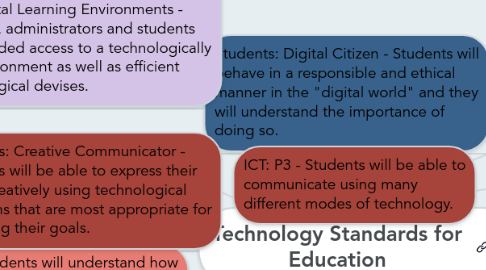Technology Standards for Education
by Carly Clarke

1. Students: Digital Citizen - Students will behave in a responsible and ethical manner in the "digital world" and they will understand the importance of doing so.
2. Teachers: Model Digital Age Work and Learning - Teachers will use technology to communicate with others (parents, students, other teachers) and will model collaborative processes using technology.
3. Teachers: Engage in Professional Growth and Leadership - Teachers will continue to educate themselves regarding the use of technology in the classroom and they will be strong advocates for the "infusion" of technology in the classroom.
4. Policy Direction 1: Student-Centered Learning - The "infusion" of technology in the curriculum serves to improve the ability and knowledge of students.
5. Policy Direction 3: Professional Learning - Teachers are responsible for being "digitally confident" in the classroom and they should continue to employ the use of technology in the classroom in effective ways.
6. Policy Direction 5: Access, Infrastructure and Digital Learning Environments - Teachers, administrators and students are provided access to a technologically rich environment as well as efficient technological devises.
7. ICT: P6- Students will use technology to collaborate and communicate with others.
8. ICT: F6 - Students will understand how to operate and work effectively with multiple technologies.
9. Students: Creative Communicator - Students will be able to express their ideas creatively using technological platforms that are most appropriate for achieving their goals.
10. ICT: P3 - Students will be able to communicate using many different modes of technology.
11. ICT: C1 - Students will access and utilize information from different technological sources.
12. Policy Direction 4: Leadership - Education Leaders are advocates for the use of technology in schools. These leaders play an active role in ensuring the continued use of technology in institutions of learning.
13. Students: Empowered Learner - Students will understand the basics of operating technology and will use technology while striving to achieve educational goals.
14. Students: Innovative Designer - Students will employ the use of technology in innovative ways to facilitate their learning.
15. Students: Global Collaborator - Students will use technology to collaborate with others and to think in a more global context. Students will use technology to work with others "locally and globally".
16. Teachers: Facilitate and Inspire Student Learning and Creativity - "Digitally confident" teachers will bring their knowledge of technology to the classroom and will use this knowledge to enable student learning and creativity. Innovation is strongly encouraged.
17. Teachers: Design and Develop Digital Age Learning Experiences and Assessments - Teachers will ensure that students have every opportunity to engage with technology in the classroom and they will develop activities involving technology to help facilitate student learning.
18. Teachers: Promote and Model Digital Citizenship and Responsibility - Teachers will model responsible and ethical behavior in the "digital world" and they will ensure that students engage in conventional and legal activities regarding technology. Key words: responsible, ethical, legal.
19. ICT: F3- Students will use technology in an ethical manner.
20. Policy Direction 2: Research and Innovation - Teachers and school administrators contribute to technological research in multiple ways in order to support advances in technology.


